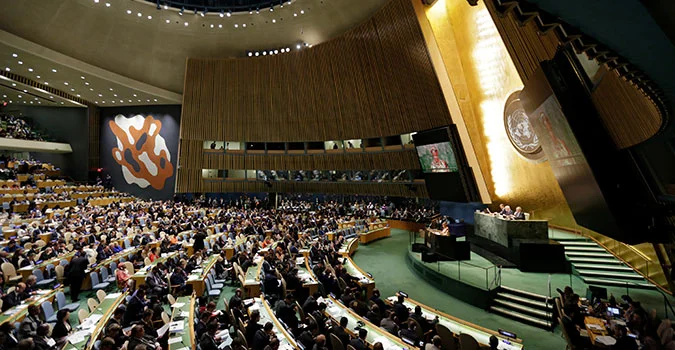McKinsey Global Institute (MGI) defines three potential scenarios in the post– COVID-19 world of women at work. The first is a gender-regressive “do nothing” scenario. It assumes that the higher negative impact of COVID-19 on women remains unaddressed, and it compares GDP outcomes in 2030 to the case in which women’s employment growth tracks that of men in the recovery. The second is a “take action now” scenario, which would improve parity relative to the gender-regressive one. The third is a “wait to take action” scenario continuing until the economic impact of COVID-19 subsides.
Read MoreThe Covid-19 crisis has exacerbated existing inequalities and disproportionately affected girls and women, but it has also demonstrated the capacity of institutional and civil society stakeholders to identify and implement rapid solutions to protect and guarantee women’s rights.
Read MoreAt a special event to mark Ukraine joining the Biarritz Partnership, the French Ambassador to the country, Etienne de Poncins, presented a formal written response from the Minister of Europe and Foreign Affairs of the French Republic, Jean-Yves Le Drian. Ukraine´s First Lady, Olena Zelenska, attended the event along with the Prime Minister, Denys Shmyhal, Foreign Minister, Dmytro Kuleba, Deputy Prime Minister for European and Euro-Atlantic Integration, Olha Stefanishyna, the ambassadors of the G7 countries and Sweden, as well as representatives of international organizations.
Read MoreIt is now widely accepted that gender parity in education and employment is critical for economic growth and societal cohesion. Pre-COVID-19 crisis the World Economic Forum predicted that at current rates of progress it will take 257 years to close the economic gender gap. Now initial evidence is showing that the socio-economic implications of COVID19 are impacting women disproportionately. Taking a gender lens in the immediate crisis response and recovery policies will be critical to advance economic gender parity.
Read MoreApplying a model of public-private collaboration on workplace gender parity developed by the Forum, Egypt is the latest country committing to action alongside eight other governments that have adopted the model. The Gender Gap Accelerator will be led by government ministers and chief executive officers in the country to take proactive action to advance women’s economic empowerment.
Read MoreFor the first time, the B20 has convened an Action Council focused on issues and challenges around Women in Business, comprising a Chair, several co-chairs, and around 60 members of the global business community. The scale and rapidly evolving nature of the challenges at play demand concerted collaboration across business, government and civil society. In the spirit of constructive collaboration, the Action Council has worked with key constituents, including but not limited to the L20, the W20, and the OECD. Across three priority themes, the Action Council proposes three policy recommendations supported by relevant research, along with specific policy actions to bring those recommendations to fruition.
Read MoreMoving toward gender equality is not only a moral and social issue, it is also vital to the Dutch economy. A new Power of Parity report from the McKinsey Global Institute and McKinsey Netherlands, Capturing the potential: Advancing gender equality in the Dutch labour market, explores the economic potential of narrowing gender gaps in the Dutch labour market.
Read MoreIn 2015, the McKinsey Global Institute published The power of parity: How advancing women’s equality can add $12 trillion to global growth. This report, which focused on the enormous potential associated with narrowing the gender gap, found that if every country did so at the same historical rate as the fastest-improving country in its regional peer group, the world could add $12 trillion to the annual gross domestic product in 2025. That’s some 11 per cent higher than it would be under the business-as-usual scenario.
Read MoreIn nearly every country today, women face barriers to fully participate in the work force and earn as much as men. Because of this, women account for only 38 percent of their country’s human capital wealth, defined as the value of the future earnings of their adult citizens—versus 62 percent for men. In low income and lower-middle income countries, women account for just a third or less of human capital wealth.
Read MoreCreate a gender-equal future
Our ability to bounce back from this crisis is dependent on how we include everyone equally. If more women take part in shaping a new social and economic order, chances are that it will be more responsive to everyone’s needs and make us all more resilient to future shocks.
The report finds that more than half of the SDG targets require a transboundary effort, meaning that achieving these 97 targets in one country will have an impact on neighboring countries, other countries or on global goods, such as climate change and sustainable fishing. However, indicators are only available for 31 of these targets, with the result of “considerable data gaps for understanding the global and inter-connected aspects of the 2030 Agenda and its implementation.” Out of the 97 transboundary targets, 50 are means of implementation targets relating to financing and supporting developing country efforts to achieve the SDGs. Transboundary targets are also heavily concentrated in the planet-related Goals, the authors note.
Read MoreFuture of Work debate has been more centered on robots than on workers. The excessive focus on automation and technology’s potential displacement of jobs has neglected other trends that are also re-shaping the labor market as we know it. Digitalization and the gig economy, demographic changes and the associated care crisis, and the demand of new skills are equally important and will have a major impact on how we understand and carry out work. Critically, evidence suggests that these trends have specific implications for gender equality and women’s empowerment.
Read MoreGender economic equity is an imperative for the global economy, including the countries represented by the G20. From a human right’s perspective, there is little question that closing gender gaps is the right thing to do. Moreover, a growing body of work argues that reducing gender inequality is economically beneficial, making the case that encouraging female economic participation, improving access to quality child care, and equitable professional opportunities in the job market can yield significant economic returns.
Read MoreThis document outlines the position of a group of research and non-governmental organizations on care needs and care policies in the G20 countries. It provides a summary of why addressing care needs is fundamental for women’s economic empowerment and labour market participation and frames these policies in terms of protecting the right to care and be cared for. We call for more effort to recognize, reduce, redistribute and represent unpaid care work and to protect the rights of paid care workers. We provide a number of examples of successful policy and programme initiatives for G20 countries to consider expanding in their own domestic policy agenda as well as their development assistance to further women’s economic empowerment globally.
Read MoreWhile women's labour insertion has significantly increased, wide gender gaps persist: women partipate less in labour markets, their employment conditions are worse, they face glass walls and ceilings and they are discriminated by the law. Achieving gender equity is not only a moral imperative, but it also key for growth and development. The G20 countries have committed to reduce the gap in labour participation 25% by 2025, yet progress has been slim and thus innovative solutions need to be implemented. This document aims to provide policy recommendations to achieve this goal and bridge gender gaps in the world of work.
Read MoreThe Womenomics initiative seeks to enhance economic growth in Japan through improved gender parity in the workforce. It includes efforts to ease barriers to female employment outside the home, promote women to leadership positions, and close the gender pay gap. Recent government policies to support the initiative have included a labor reform law, expanding day care facilities, and a law requiring action plans from companies of a certain size to increase female employment.
Read MoreThis event aims to accelerate the pace towards achieving equal pay for work of equal value, aligning with SDG 8.5 and SDG 5. One year after the launch of EPIC, global leaders, including Heads of State, CEOs of multinational companies, Heads of employers’ and workers’ organizations, and representatives of renowned universities and civil society organizations are coming together to publicly demonstrate their commitment to work together under the EPIC umbrella by making a pledge.
Read MoreTo guide business on empowering women and advancing gender equality in the workplace, marketplace and community, the UN Global Compact and UN Women developed the Women’s Empowerment Principles (WEPs), launched in 2010. The Seven Principles offer a holistic framework based on real-life practices for business to advance gender equality and women’s empowerment. Beyond positive impacts for a company’s direct operations, implementing the WEPs contributes to a range of targets under the Sustainable Development Goals (SDGs). To date, over 1,800 CEOs from around the world have signed the CEO Statement of Support and have committed to continuous leadership and improvement on gender equality and women’s empowerment.
Read MoreThere is no doubt that women have made important gains in the global economy. Today, a third of the world’s enterprises are run by women and their management skills are increasingly recognized. There is increased evidence and recognition that gender balanced and diverse management teams at all levels of hierarchies produce positive business outcomes. Improved labour market participation rates of women is increasingly correlated with higher levels of growth and gross domestic product. Yet, gender stereotypes across all social and cultural contexts limit women’s economic contribution and benefits. Thus, the enormous talent pool that women represent with their ever-higher levels of education goes largely untapped.
Read MoreWomen’s economic empowerment is a pre-requisite for inclusive and equitable economic growth. A powerful lever for change, women’s economic empowerment can drive gender equality outcomes and broader intergenerational benefits for women, their children, households and communities. Evidence tells us that women who are economically empowered have greater access to income and economic assets, better control over their own economic gains and more equitable decision-making power to translate these gains into social, economic, and health benefits for themselves and their families.
Read More


















